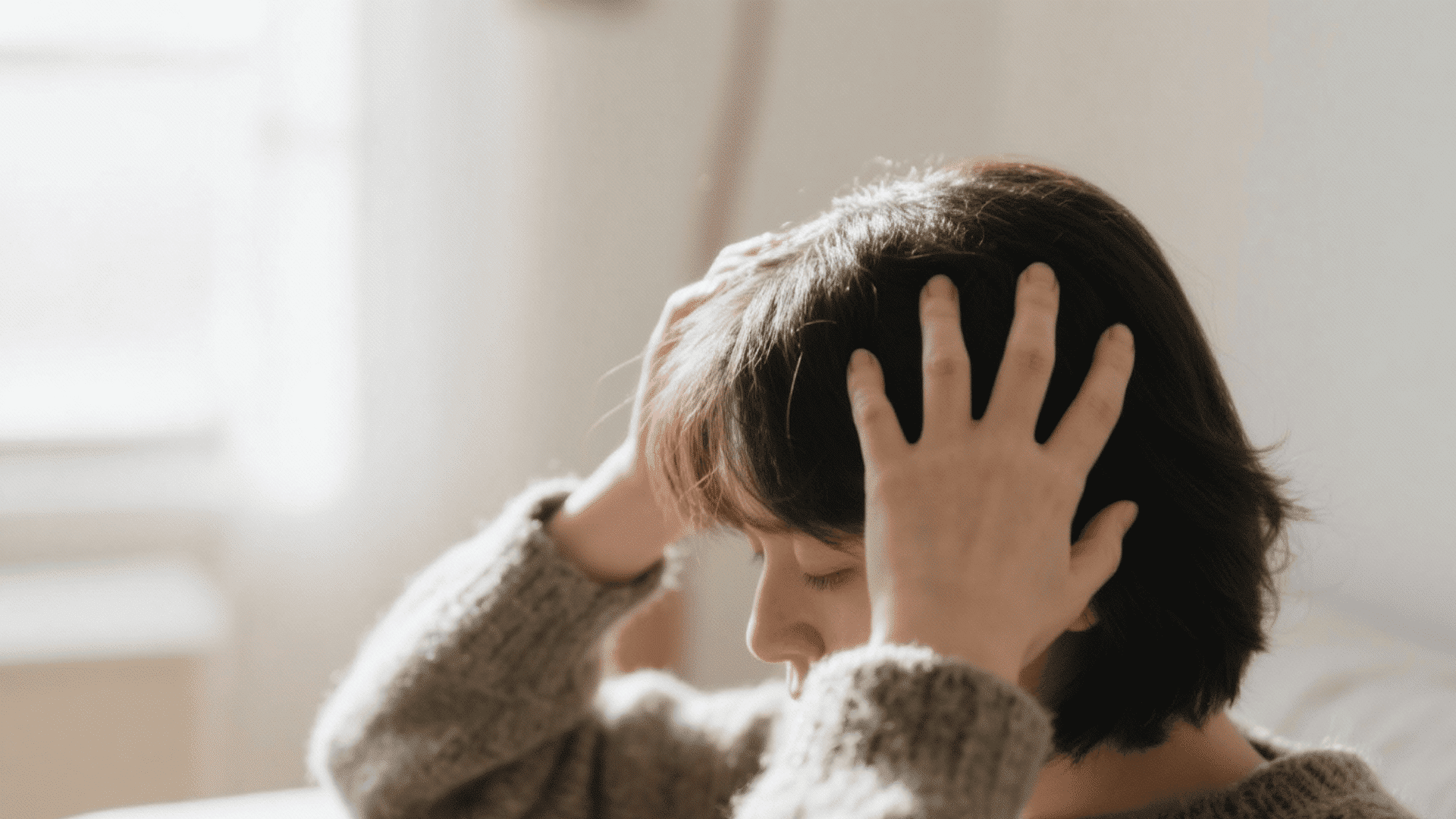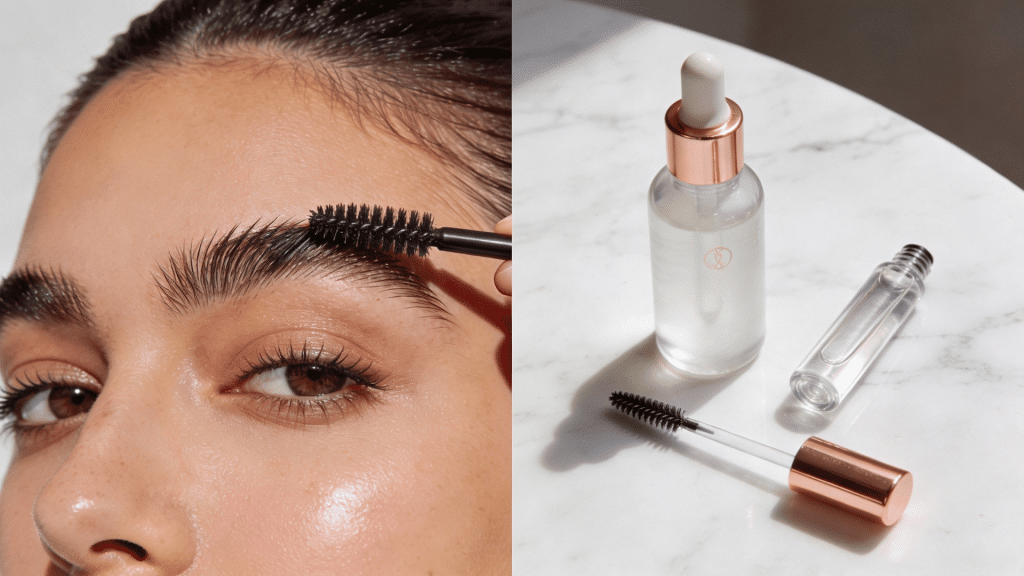That sharp ache when brushing hair or the constant discomfort when the scalp is touched affects countless people worldwide. Many individuals find themselves asking, “why is my scalp sore?” as they deal with this frustrating condition.
Scalp tenderness affects millions and can turn simple daily routines into uncomfortable experiences.
It isn’t something people have to live with because most cases have identifiable causes and respond well to the right treatment approach.
In this blog, find out what triggers scalp sensitivity, the warning signs to watch for, and practical treatment options that actually work.
What is Scalp Tenderness?
Scalp tenderness refers to any discomfort, pain, or sensitivity felt across the scalp when touched or brushed.
A tender scalp can affect specific areas or cover the entire head surface. This condition manifests in different ways for different people.
Some experience dull aches or sharp pains, varying from barely noticeable to severe. It can develop gradually or suddenly, with areas feeling warm, slightly swollen, and tender, intermittently or all day.
Understanding what’s normal for your scalp helps identify when something’s wrong. Most healthy scalps should feel comfortable during regular hair care routines and daily activities.
Symptoms of Scalp Tenderness
Recognizing the signs helps determine the best course of action when dealing with scalp discomfort.
When someone asks, “why is my scalp sore,” understanding why is my scalp sore through these symptoms can provide important clues for proper treatment.
| SYMPTOM | DESCRIPTION |
|---|---|
| Pain or discomfort | Aching, throbbing, or sharp sensations across the scalp |
| Sensitivity to touch | Increased discomfort when the scalp is touched or pressed |
| Itchy or irritated scalp | Persistent urge to scratch accompanied by discomfort |
| Redness or inflammation | Visible changes in scalp color or swelling |
| Tenderness when combing or brushing hair | Pain during regular hair care activities |
These symptoms can occur individually or in combination, depending on the underlying cause. The severity and duration vary from person to person.
Why is My Scalp Sore?
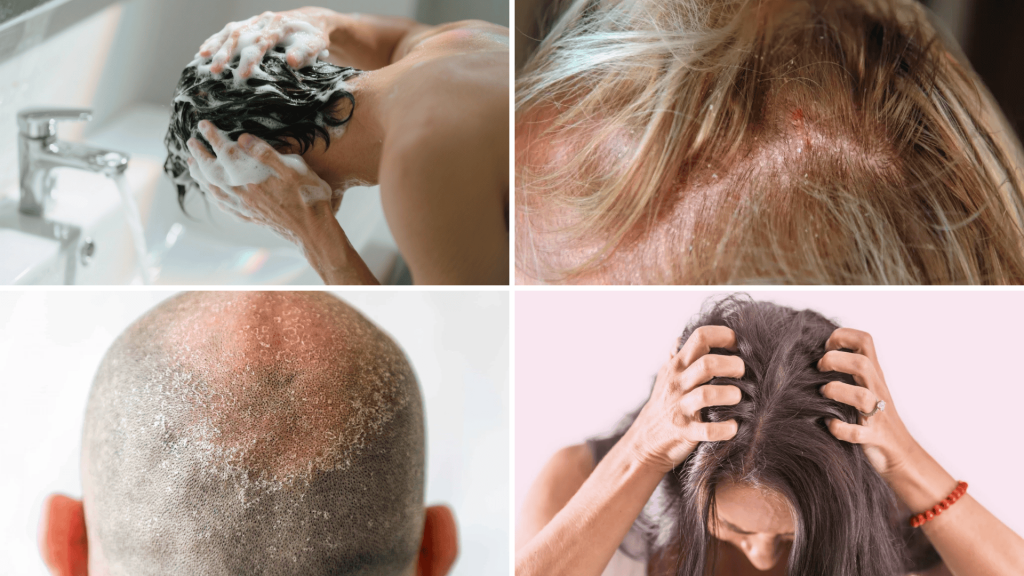
Several factors can contribute to it. Understanding these common causes helps identify the most appropriate treatment approach for your specific situation.
1. Hair Care Products and Chemical Exposure
Many everyday hair products contain harsh ingredients, such as sulfates, that strip away the scalp’s natural protective oils, leading to irritation and sensitivity.
When the scalp’s barrier becomes compromised, even gentle touching can cause pain and discomfort.
2. Tight Hairstyles and Scalp Tension
That sleek ponytail or intricate braid might look great, but the constant pulling creates tension that stresses hair follicles and radiates through scalp tissues.
Even after letting hair down, this tension can leave the scalp feeling sore and tender for hours or even days.
3. Infections
Sometimes it signals an underlying infection that needs medical attention. Fungal infections, such as ringworm, appear as scaly, circular patches that feel tender to the touch.
Bacterial infections often develop when people scratch irritated areas, creating open wounds that become infected.
4. Sunburn and UV Damage
The scalp gets forgotten during sun protection routines, but it’s just as vulnerable as other skin. A day at the beach without a hat can leave the scalp red, tender, and peeling.
Repeated sun damage makes the scalp chronically sensitive and increases the risk of more serious skin issues.
5. Hormonal Changes and Stress
Life changes like pregnancy, menopause, or high-stress periods can make the scalp suddenly sensitive. Hormonal fluctuations affect how much oil the scalp produces and change skin thickness.
What was once a simple hair care routine can become uncomfortable and frustrating. Identifying the cause is the first step toward relief. With the right treatment, you can restore scalp comfort and health.
What Causes Scalp Tenderness?
Beyond obvious triggers, several underlying factors contribute to scalp sensitivity. These causes often work together to create persistent discomfort and irritation.
- Poor Blood Circulation: Limited blood flow to the scalp reduces oxygen and nutrient delivery to hair follicles. This happens due to tight headwear, poor sleeping positions, or underlying circulation problems.
- Stress and Anxiety: Mental stress manifests physically throughout the body, including scalp tension and sensitivity. Chronic anxiety causes muscle tightness in the head and neck areas.
- Hormonal Changes: Fluctuating hormones during pregnancy, menopause, or menstrual cycles can affect scalp sensitivity. These changes alter oil production and skin thickness dramatically.
- Extreme Weather Conditions: Cold, dry air strips moisture from the scalp, leading to irritation and flaking. Hot, humid conditions increase sweating and create environments where bacteria thrive.
- Product Allergies and Sensitivities: Contact dermatitis develops when the immune system reacts to specific product ingredients. Common allergens include fragrances, preservatives, and certain plant extracts.
- Age-Related Skin Changes: As people age, scalp skin becomes thinner and less resilient to daily stressors. Reduced collagen production makes the scalp more prone to sensitivity and slower healing.
Understanding these various causes helps create a comprehensive approach to treatment. Most cases involve multiple contributing factors rather than a single cause.
How to Treat Scalp Tenderness?
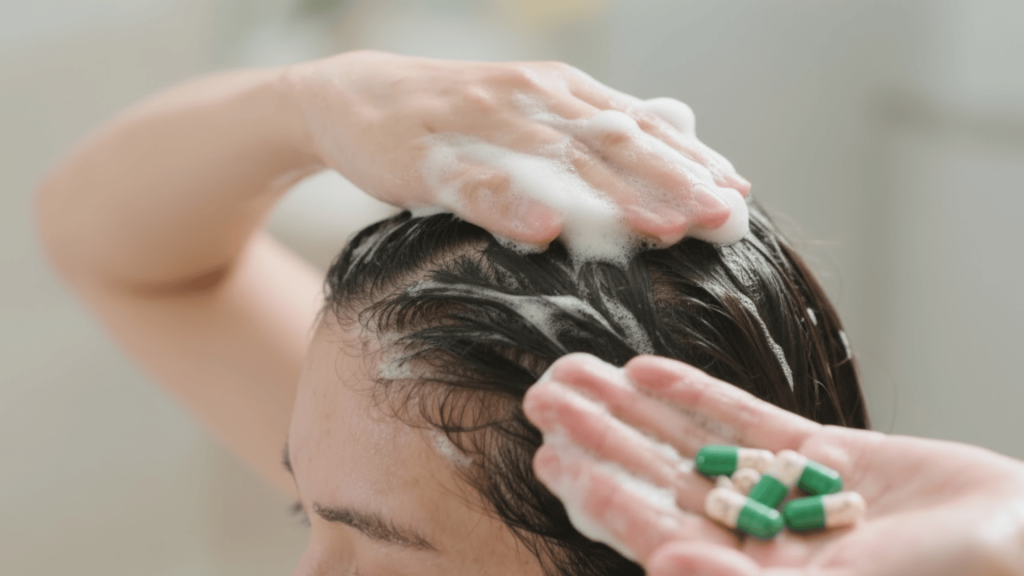
Treatment options vary depending on how bad the tenderness is and what’s causing it. Most cases get better with gentle care and the right treatments when used regularly.
1. Medicated Shampoos
Special shampoos with ingredients like ketoconazole or coal tar work well for fungal infections and inflammation. These products help reduce irritation and control scalp conditions that cause tenderness.
Use them as your doctor suggests or follow the bottle instructions. Most people see improvement within a few weeks of regular use.
2. Over-the-Counter Pain Relief
Creams with menthol or lidocaine give quick relief from scalp pain and discomfort. These products numb the sore area for a while as other treatments work on fixing the main problem.
Gently apply a small amount to clean skin, carefully avoiding the delicate eye and mouth areas to prevent irritation.
3. Gentle Hair Care Changes
Switch to mild shampoos without strong fragrances to reduce scalp irritation. Wash your hair with warm water instead of hot water to prevent drying out your scalp.
Avoid tight ponytails and braids that pull on your hair. Dry your hair gently with a soft towel instead of rubbing hard.
4. Anti-Inflammatory Medicine
Pills like ibuprofen or aspirin can help reduce scalp swelling from the inside out. These work well for people with widespread tenderness or ongoing inflammatory problems.
Talk to your doctor before taking these medicines regularly. Some people also use prescription creams applied directly to their scalp.
5. Professional Medical Help
See a skin doctor if home treatments don’t help after several weeks of trying them consistently. Doctors can give stronger medicines or do tests to find out what’s really causing the problem.
They might suggest prescription shampoos or steroid creams. Getting professional help early often prevents small problems from getting worse.
The key to getting better is finding out what’s causing your it and picking the right treatments. Starting treatment early often stops minor scalp problems from turning into serious conditions.
Home Remedies for Scalp Tenderness
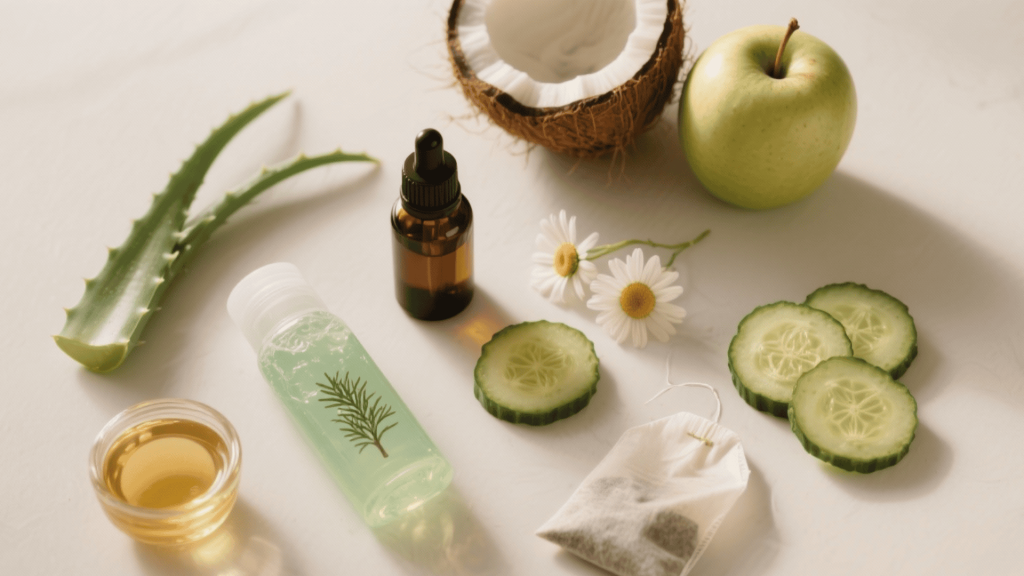
Natural remedies offer effective relief for many people experiencing it. These treatments are generally safe and can complement medical approaches when used properly.
1. Soothing Scalp Massages
Gently massage the scalp using circular motions with clean fingertips. Apply light to moderate pressure for 5-10 minutes, focusing on tender areas. Avoid aggressive rubbing that might worsen irritation.
- Benefits: Improves blood circulation and reduces muscle tension
- How It Works: Mechanical stimulation promotes blood flow and releases natural pain-relieving chemicals
- Frequency: Daily, preferably before bedtime for relaxation
2. Aloe Vera Gel
Apply pure aloe vera gel directly to clean, damp scalp areas. Massage gently into affected regions and leave on for 20-30 minutes. Rinse thoroughly with lukewarm water and mild shampoo.
- Benefits: Provides anti-inflammatory and cooling effects on irritated skin
- How It Works: Contains natural compounds that reduce inflammation and soothe damaged tissue
- When to Use: 2-3 times per week for optimal healing results
3. Tea Tree Oil
Mix 3-5 drops of tea tree oil with 1 tablespoon of carrier oil like coconut or jojoba. Apply the mixture to the scalp, massage gently, and leave for 15 minutes before washing out completely.
- Benefits: Offers antimicrobial and anti-inflammatory properties for scalp health
- How It Works: Natural compounds fight harmful bacteria and reduce scalp inflammation
- Frequency: Once or twice weekly to prevent over-drying sensitive skin
4. Warm Oil Treatment
Heat coconut, olive, or jojoba oil until comfortably warm but not hot. Apply generously to scalp and massage for 5 minutes using gentle circular motions. Cover with a shower cap for 30 minutes.
- Benefits: Provides deep moisturization and improves overall scalp health
- How It Works: Oils penetrate scalp tissue and restore natural moisture balance
- When to Use: Weekly treatments work best for dry or chronically irritated scalps
5. Apple Cider Vinegar Rinse
Dilute 2 tablespoons of apple cider vinegar in 1 cup of cool water. Pour mixture over clean, wet hair after regular shampooing. Allow to sit for 2-3 minutes before final rinse.
- Benefits: Restores natural pH balance and reduces harmful bacterial growth
- How It Works: Acidic properties normalize the scalp environment and remove product buildup
- Frequency: Once weekly to maintain healthy scalp pH levels
6. Chamomile Tea Compress
Brew strong chamomile tea using 2-3 tea bags and let cool completely. Soak a clean cloth in the cooled tea and apply to tender scalp areas for 10-15 minutes.
- Benefits: Provides natural anti-inflammatory and calming effects on irritated skin
- How It Works: Chamomile compounds reduce inflammation and soothe damaged scalp tissue
- When to Use: As needed during flare-ups for immediate soothing relief
7. Cucumber Slices
Cut a fresh cucumber into thin slices and chill in the refrigerator for 30 minutes. Place cold slices directly on tender scalp areas for 10-15 minutes, replacing as they warm up.
- Benefits: Delivers immediate cooling relief and mild anti-inflammatory action
- How It Works: Natural cooling effect reduces inflammation and provides instant comfort
- Frequency: Daily during acute flare-ups for immediate symptom relief
These home remedies are most effective when used consistently in conjunction with proper hair care practices for sustained scalp health.
Preventing Scalp Tenderness
Prevention often proves easier than treatment when dealing with scalp sensitivity. Simple lifestyle adjustments can significantly reduce the likelihood of developing tender scalp issues.
Taking proactive steps helps maintain optimal scalp health over time:
- Choose gentle, sulfate-free hair products specifically designed for sensitive scalps
- Avoid tight hairstyles that create constant pulling and tension on hair follicles
- Wash hair with lukewarm rather than hot water to prevent excessive drying
- Use wide-tooth combs on wet hair to minimize pulling and potential breakage
- Protect your scalp from harsh sun exposure with hats or UV-protective products
- Maintain a balanced diet rich in vitamins and minerals for healthy scalp function
Conclusion
Scalp tenderness doesn’t have to be a permanent burden that disrupts daily life.
From harsh hair products to tight hairstyles, most underlying causes are manageable with the right knowledge and consistent care.
The key lies in identifying personal triggers and responding quickly before minor irritation becomes chronic discomfort.
For those dealing with persistent symptoms, professional medical guidance ensures proper diagnosis and treatment. Taking action today means healthier, more comfortable scalps tomorrow.
Taking action today means healthier, more comfortable scalps tomorrow.

